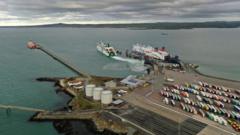Is Putin a Long-Term Threat to Europe's Freedom?

The Long-Term Threat of Putin to Europe: Insights from German Leadership
In recent years, the geopolitical landscape of Europe has been increasingly dominated by the actions of Russian President Vladimir Putin. The German Chancellor, Friedrich Merz, has vocalized concerns that the threat posed by Putin extends far beyond the borders of Ukraine, affecting the entire European political order. This article delves into the implications of these warnings, the need for a robust defense strategy in Europe, and the collaboration between European nations in response to this evolving threat.
Understanding the Geopolitical Context
The backdrop of these statements from Chancellor Merz is rooted in a complex history of European relations with Russia. Since the annexation of Crimea in 2014, tensions have escalated significantly, leading to a series of conflicts and a re-evaluation of security protocols across the continent. As Putin continues to assert his influence through military aggression and political maneuvering, the need for a unified response from European nations becomes increasingly critical.
The Warning Signs
Chancellor Merz's remarks highlight several key concerns:
- Military Aggression: Putin's actions in Ukraine serve as a stark reminder of the potential for further expansionism. The annexation of Crimea and ongoing conflicts in the Donbas region illustrate a willingness to challenge international borders.
- Political Manipulation: Russia has been accused of meddling in various European elections, influencing public opinion through disinformation campaigns and fostering division within EU nations.
- Energy Dependency: Many European countries rely heavily on Russian energy supplies, which poses a security risk. This dependency can be leveraged by Russia to exert political pressure.
Merz's Call for Action
In light of these challenges, Chancellor Merz has called for a significant shift in Europe’s defense strategy. He acknowledged that the continent has been overly reliant on the United States for security and emphasized the need for European nations to enhance their own military capabilities.
Addressing the Free-Rider Problem
One of the most critical aspects of Merz’s message was the admission that European countries have acted as "free riders" in terms of defense spending. This acknowledgment resonates with sentiments expressed by former U.S. President Donald Trump, who criticized European nations for lacking sufficient investment in their own security. Merz's statements reflect a growing consensus that Europe must take greater responsibility for its defense.
Strategic Defense Initiatives
In response to these challenges, several strategic initiatives are being proposed and implemented:
Increased Defense Spending
Chancellor Merz has advocated for changes in the German constitution to allow for a significant increase in defense spending. This move is seen as a necessary step to bolster Germany’s military capabilities, ensuring that the country is prepared to respond to threats from Russia and elsewhere.
Collaborative Defense Projects
Germany is not alone in this endeavor. The United Kingdom, France, and Germany are collaborating on an alliance known as the E3 to strengthen their security frameworks. This partnership focuses on:
- Joint Military Projects: Collaborations include the production of the Typhoon Eurofighter jets and Boxer armored vehicles, enhancing the military capabilities of these nations.
- Long-Range Missile Development: Efforts are underway to develop a missile with a range of 2,000 km, aiming to provide strategic advantages in potential conflicts.
- Support for Ukraine: The E3 alliance has committed to providing Ukraine with advanced military support, including long-range fire capabilities, to bolster its defense against Russian aggression.
The Role of the United States
The relationship between Europe and the United States remains pivotal in addressing the threats posed by Russia. During a security conference in Munich, U.S. Vice-President JD Vance reiterated the need for European nations to take greater ownership of their defense strategies. The U.S. has historically played a crucial role in NATO's framework, but as Merz and others have pointed out, the time has come for Europe to step up.
American Military Support
Under the Trump administration, there have been commitments to send advanced weapons systems, such as Patriot missiles, to Ukraine to counteract Russian advances. This move signifies a strong U.S. stance against Russian aggression but also highlights the reliance of European nations on American military support.
Potential Trade Implications
As tensions escalate, trade relations between the U.S. and Europe have also come under scrutiny. Trump’s threats to impose sanctions on European imports could lead to significant economic repercussions. Denmark’s Foreign Minister Lars Rasmussen expressed that such actions would be "absolutely unacceptable and unjustified," emphasizing the need for Europe to navigate these complexities delicately.
Retaliatory Measures
The European Union has indicated that it is considering retaliatory tariffs should the U.S. implement sanctions. This situation underscores the interconnected nature of global politics, where military actions and economic policies are intricately linked.
Looking Forward: The Future of European Security
As Chancellor Merz articulates the potential long-term threat that Putin poses to Europe, it is essential for European leaders to prioritize collective security measures. The evolving geopolitical landscape necessitates a united front, with countries collaborating not just on defense but also on economic growth and political stability.
Building Resilience
While the immediate focus remains on military readiness, European nations must also consider other aspects of resilience:
- Cybersecurity: As cyber threats from Russia and other adversaries increase, bolstering cybersecurity measures is critical for protecting electoral integrity and national infrastructure.
- Energy Independence: Reducing dependency on Russian energy through diversification of energy sources and investment in renewable technologies will enhance Europe’s security posture.
- Public Awareness: Educating citizens about disinformation campaigns and fostering a unified public front will be crucial in countering political manipulation.
Conclusion
As Europe navigates the complexities of its relationship with Russia, the warnings from Chancellor Merz serve as a crucial reminder of the need for vigilance and proactive measures. The potential threats posed by Putin extend beyond Ukraine, impacting the peace and political order of Europe as a whole. By increasing defense spending, fostering collaboration among nations, and addressing economic vulnerabilities, Europe can better prepare for the challenges that lie ahead.
In this era of uncertainty, how do you think European nations should respond to the threats posed by Russia? What strategies could potentially strengthen their collective security? #EuropeanSecurity #DefensiveStrategy #GeopoliticalChallenges
FAQs
What are the main threats posed by Putin to Europe?
Putin's primary threats include military aggression, political manipulation, and economic leverage through energy dependency, which can destabilize the political order in Europe.
How is Germany responding to the threat from Russia?
Germany plans to increase defense spending and collaborate with allies in military projects, while also pushing for constitutional changes to support these efforts.
What is the E3 alliance?
The E3 alliance comprises the United Kingdom, France, and Germany, focusing on enhancing security and military collaboration in response to threats in Europe.
Published: 2025-07-18 07:04:22 | Category: News



